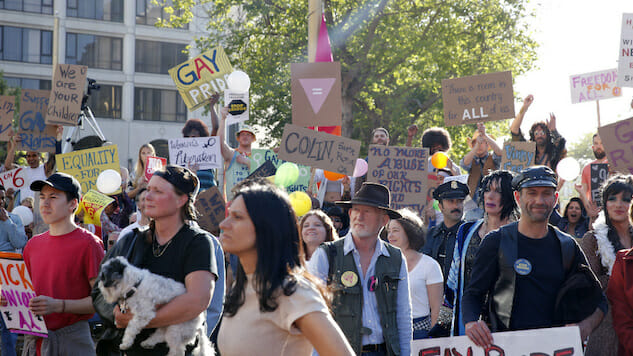Dustin Lance Black Hopes LGBT Equality Miniseries When We Rise Is a “Road Map” for “Difficult Times”
ABC/Ron Koeberer
There’s a scene early on in creator Dustin Lance Black’s new miniseries, When We Rise, in which a wide-eyed and naïve Roma Guy (Tony nominee Emily Skeggs, rocking a Ramona Quimby-esque bowl cut) tries and fails to convince a group of like-minded lesbian activists in 1970s San Francisco to include other disenfranchised women—maybe even some gay men—in their upcoming protest.
It doesn’t go well for her.
The idea that we’d all benefit if we banded together isn’t something that went out with end of Carter administration. In fact, it’s what motivated Black to pitch his project to ABC in the first place.
“I was getting concerned about four years ago that, while working in the LGBT movement, that LGBT people were becoming a bit self-interested and myopic,” Black explains of his eight-hour miniseries, which premieres February 27, during a phone interview with Paste. “We were fighting really hard for our own rights, but I didn’t see that we were working as hard for our brothers and sisters in other social justice movements. As a student of history, I knew that was a mistake. It’s pretty obvious that no minority can succeed at winning equality on their own.”
Told through both modern-day narration and flashbacks to liberal activists’ origin stories, their days standing up for equality in and around San Francisco’s Castro district, When We Rise mostly focuses on the points of view of LGBT people. In addition to Guy, played by Mary-Louise Parker in the present-day narration, there are also characters based on activists Cleve Jones (Austin P. McKenzie in the past; Guy Pearce in the present) and lesbian/radical feminist educator Sally Gearhart (Carrie Preston). Black also felt it was important to include trans people in his story—and that, naturally, trans actors should be the ones to play these parts. Ivory Aquino, who publicly outed herself in January, plays trans activist Cecilia Chung.
Black added that he liked the title When We Rise because “it was open ended and we could finish the sentence in different ways: When we rise in America, we will blank; when we rise in Texas; when we rise in the Middle East; when we rise in Uganda; when we rise in Russia.” (Last year, Jones published a memoir by the same name though it was written independently and Black says he’s never read it; rather, he says, “we inspire each other and we definitely agree to share a title.”)
“If you see the entire series, this story is not a complete story,” Black continues. “This story is a baton that is being passed to a new generation and it is a torch that, I hope, will call an older generation back to the fight.”
History has shown that it’s easy for writers, including those with the best of intentions, to fall into stereotypes when depicting LGBT characters—even if the script comes from out and proud members of the community like Black. Factor this in with the miniseries airing on ABC, a network that might be home to Shondaland but is still under the Walt Disney Company umbrella, and it’s understandable that When We Rise may raise red flags in the minds of some audience members.
-

-

-

-

-

-

-

-

-

-

-

-

-

-

-

-

-

-

-

-

-

-

-

-

-

-

-

-

-

-

-

-

-

-

-

-

-

-

-

-








































